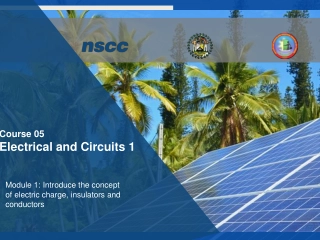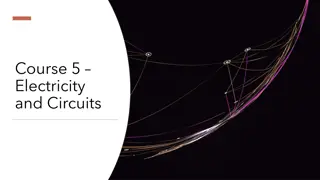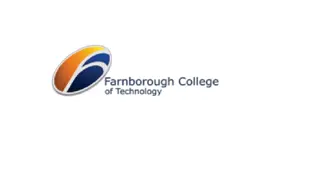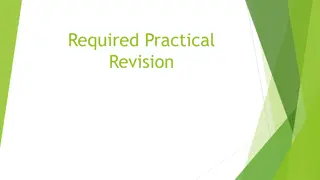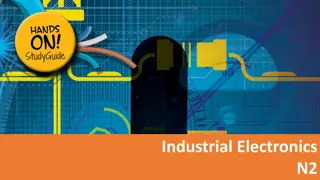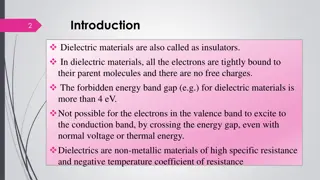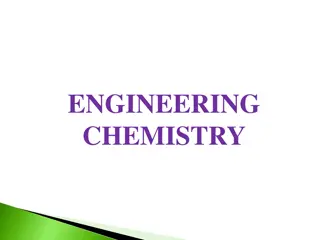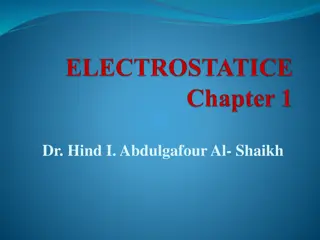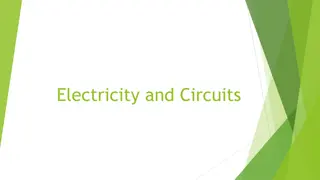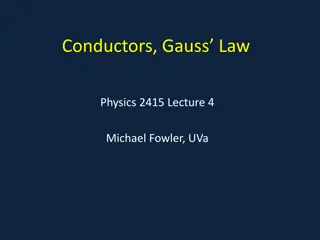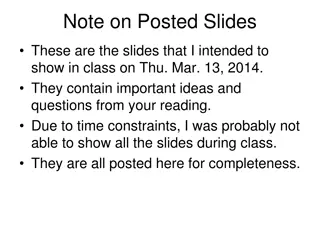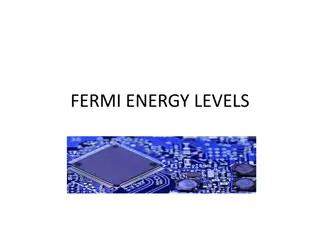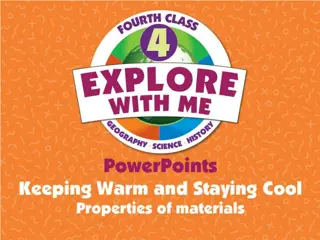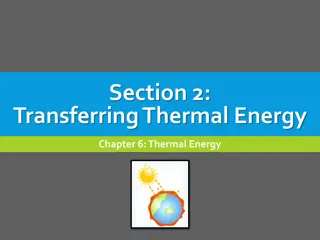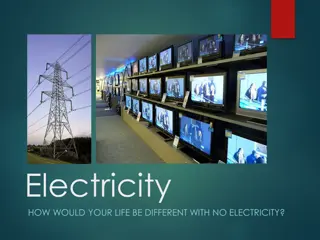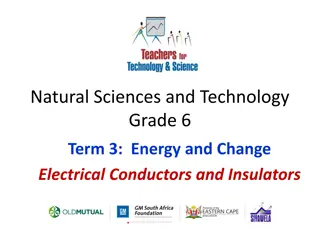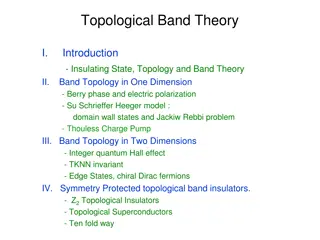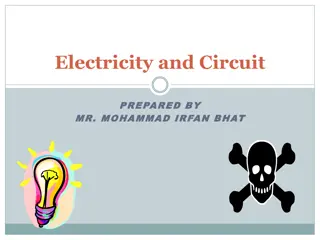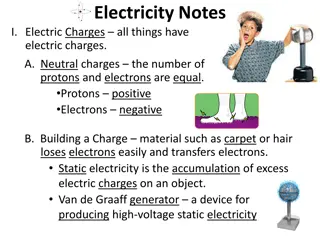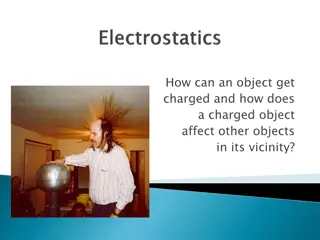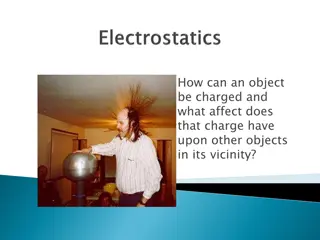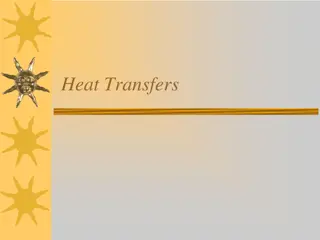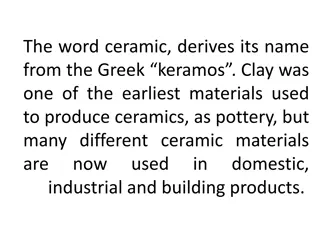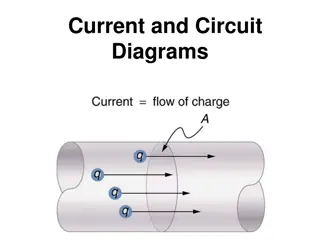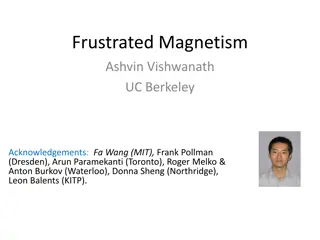Electrical and Circuits 1
Electric charge, insulators, conductors, and electrical flow through materials. Understand static electricity and examples of static charge uses. Discover the concept of insulators with analogies and examples.
0 views • 26 slides
ECE 305 Electromagnetic Theory
Explore the fundamental concepts of electric fields in material space, covering topics such as free space, conductors, insulators, semiconductors, current conduction, and charge density. Delve into the properties of materials, convection vs. conduction current, and the role of superconductors in ele
1 views • 25 slides
Exploring Electricity Concepts: From Atoms to Static Electricity
This content delves into the basics of electricity, covering topics such as atoms, charges, static electricity, simple circuits, and more. Learn about the difference between naturally occurring and human-harnessed electricity, explore the concept of charges in objects, and discover how static electr
5 views • 14 slides
Understanding Electricity and Circuits: Basics, Components, and Applications
This educational course covers topics such as circuit symbols, calculating and measuring electrical quantities, identifying circuits, and understanding the relevance of electricity in engineering. It explains essential circuit components like energy sources, conductors, insulators, loads, control de
12 views • 30 slides
Understanding Insulators: Properties, Materials, and Testing
An insulator is a crucial device used to support and insulate electric conductors or equipment from ground or other conductors. This article covers the definition, desirable properties, materials used, ratings, and testing methods of insulators, including flashover tests, sample tests, and routine t
1 views • 33 slides
Understanding Electron Theory and the Structure of Matter
The structure of matter is intricately tied to electron theory, where molecules are made up of atoms containing protons and electrons. An electrically neutral atom has an equal number of protons and electrons. A flow of electrons creates an electric current, which can be measured by an ammeter. Cond
0 views • 11 slides
Understanding Thermal Conductors and Insulators in Energy Transfer
Today's lesson focuses on energy transfer, specifically on conductors and insulators. Learn about the characteristics of thermal conductors and insulators, how they affect the flow of thermal energy, and their real-life applications. By the end of this lesson, you will be able to distinguish between
0 views • 13 slides
Overview of Semiconductor Materials and Applications
Understanding electronic transport in semiconductors is essential for various applications such as computers, smartphones, LEDs, and more. Semiconductors like silicon and compound semiconductors play a crucial role in creating devices with unique properties. By delving into the world of semiconducti
0 views • 20 slides
Physics Practical Revision Guide
Explore practical experiments in physics including determining specific heat capacity, investigating thermal insulators, resistance, calculating densities of solid objects and liquids, and more. Get hands-on with measuring mass, volume, temperature changes, and conducting circuit experiments. Enhanc
0 views • 14 slides
Understanding Electrical Principles in Industrial Electronics
Explore the fundamentals of industrial electronics, starting with direct current principles related to atomic theory, conductors, insulators, and resistors in series and parallel. Then, delve into alternating current principles, including generating an alternating voltage, alternating current (AC) b
0 views • 46 slides
Understanding Dielectrics and Insulators in Electrical Engineering
Dielectric materials, also known as insulators, have tightly bound electrons with no free charges, characterized by a forbidden energy band gap of over 4 eV. Insulators, on the other hand, prevent electric current flow due to high resistivity and strong covalent bonds. Learn about the differences, d
1 views • 22 slides
Understanding Electrochemistry in Engineering Chemistry
Electrochemistry in engineering chemistry explores the interactions between electrical and chemical energy, involving the conversion of energy forms. It discusses electrical conductors, insulators, metallic conductors, good conductors, semiconductors, and electrolytic conductors. The concept of elec
4 views • 56 slides
Understanding Electrical Conductors and Insulators
Electrical conductors like metals allow the flow of charge, while insulators like wood and plastic impede the flow. Copper, silver, and aluminum are examples of good conductors, with high conductivity. Insulators have high resistivity, preventing the easy flow of electric current. Learn about the pr
3 views • 5 slides
Understanding Electric Charges and Conductors in Physics
Explore the fundamentals of electrostatics, electric charges, conductors, and insulators in physics. Learn about the Law of Electric Charges, types of charge, conductors vs. insulators, and methods of charging objects through friction, conduction, and induction. Dive into the world of atoms, electro
1 views • 14 slides
Guide to Different Types of Hardware for Gates and Fences
Learn about various types of hardware used for gates and fences, including gate latches, strap hinges, butt hinges, T-hinges, barrel bolts, continuous hinges, electric fence insulators, wire stretchers, wire grips, welded wire fences, and T-post insulators. Explore their functions and common uses wi
0 views • 26 slides
Understanding Electricity: Atoms, Circuits, and Charges
Discover the fundamentals of electricity through atoms, circuits, and electric charges. Learn how electrons flow, how circuits are created, and the key elements in a circuit. Explore conductors and insulators, and understand the basic properties of electric charges. Unveil the mysteries behind Coulo
0 views • 8 slides
Insights on Conductors and Gauss Law in Physics
Explore electric fields in and near conductors, understand Gauss Law, and delve into the behavior of electrons inside a conductor. Discover why there can be no electric field inside a conductor in electrostatics and learn about the distribution of charges on a conductor's surface. Consider scenarios
4 views • 19 slides
Understanding Electrostatics and the Nature of Electric Charges
Explore the fascinating world of electricity and electrostatics through the discoveries of Benjamin Franklin and experiments showing the forces between charged objects. Learn about electric charges, the electric force, Coulomb's Law, conductors, insulators, electric fields, potentials, and energy st
0 views • 49 slides
Understanding Insulators and Energy Bands in Materials
Explore the concept of insulators and energy bands in materials, focusing on the forbidden gap, Fermi energy levels, and the classification of solids based on electrical conductivity. Learn about the role of insulators, the energy gap in insulators, and examples of insulating materials like rubber a
0 views • 48 slides
Understanding Semiconductors: Types, Properties, and Differences
Semiconductors bridge the gap between insulators and conductors, exhibiting varying levels of electrical conductivity based on temperature. This tutorial covers intrinsic semiconductors, differences between silicon and germanium, and the essential properties of semiconductors. Learn about the roles
0 views • 25 slides
Understanding Semiconductors: Intrinsic and Extrinsic Types
Semiconductors play a crucial role in electronic devices, with materials falling into three categories based on electric conductivity: Conductors, Insulators, and Semiconductors. Intrinsic semiconductors are chemically pure, while extrinsic semiconductors have impurities added to enhance their condu
0 views • 39 slides
Understanding the Properties of Materials for Clothing Selection
Different types of garments are required for varying weather conditions and activities. Fashion designers must comprehend material properties to choose the ideal fabric for maintaining garment functionality. Fabrics like wool and fleece serve as thermal insulators, keeping individuals warm in cold w
0 views • 17 slides
Understanding Thermal Energy Transfer Methods
Explore the three primary ways thermal energy is transferred - conduction, convection, and radiation. Dive into the characteristics of good conductors, such as metals, and how they facilitate heat transfer. Learn about the role of insulators in controlling thermal energy flow and discover the best h
1 views • 24 slides
Understanding Electricity: Conductors, Insulators, and Current
Electricity is essential for modern life, with conductors allowing electron flow and insulators preventing it. Learn about the basics of atoms, electrons, and how electricity works through conductors and insulators. Discover the role of current and how electrons behave in different materials, drawin
0 views • 19 slides
Understanding Electrical Conductors and Insulators in Grade 6 Natural Sciences and Technology
Explore the topic of electrical conductors and insulators in Grade 6 Natural Sciences and Technology, learning about wiring a three-pin plug, the colors of the live, neutral, and earth wires, and the steps involved in wiring a South African three-pin plug. Gain insight into the roles of each wire an
0 views • 14 slides
Exploring Fractionalized Topological Insulators and Majoranas
This discussion delves into the transition from fractionalized topological insulators to fractionalized Majorana modes, highlighting key concepts in topological phases of matter, quantum Hall effects, and interactions in fractional quantum Hall effects. Emphasis is placed on 3D topological insulator
0 views • 23 slides
Understanding Insulation and Energy Saving in Grade 7 Natural Sciences
Exploring the significance of insulating materials in energy conservation. Learn how various materials help in keeping cold items cold and hot items hot, along with the importance of insulation for heat transfer reduction. Discover the types of insulators, including those with air spaces like wool,
0 views • 10 slides
Exploring Topological Band Theory and Quantum Phases in Electronic Matter
Delve into the fascinating realm of topological band theory, examining the insulating state, band topology in different dimensions, symmetry-protected topological band insulators, and the interplay between symmetry and topology. Uncover the principles underlying matter symmetry, quantum phases, and
0 views • 29 slides
Understanding Electricity and Circuits: Basics and Components
Delve into the world of electricity and circuits with this comprehensive lesson. Learn about electric cells, bulbs, wires, switches, conductors, and insulators. Explore how electricity flows, the components of an electric circuit, and the production of electricity in cells. Discover the construction
0 views • 32 slides
Understanding Energy and Electricity in Clean Energy Nature Sunday Academy
Explore the basics of atoms, electrons, and electricity, along with the formation of molecules and the concept of energy in the universe. Discover the relationship between conductors and insulators, the common uses of energy, and how electricity powers various aspects of our lives. Join the session
0 views • 29 slides
Understanding Electricity: Charges, Conductors, Insulators, and Storms
Explore the fundamentals of electricity, including electric charges, neutral charges, static electricity, conductors, insulators, lightning storms, and the phenomenon of lightning strikes. Learn about the laws of conservation of charge, electric fields, and the properties of conductive and insulatin
0 views • 23 slides
Understanding Electric Charge and Interactions Between Objects
Matter is composed of neutrons, protons, and electrons with different charges. Being charged means having an excess or shortage of charge. Grounding, insulators, conductors, and methods of charging play important roles in how objects get charged. By contacting charged objects with objects that can g
0 views • 33 slides
Understanding Object Charging and Its Effects
Matter is composed of atoms with charged parts such as protons and electrons. By moving electrons, objects can be charged, leading to different types of charges - positive, negative, or neutral. Charged objects can interact with other objects based on their charges, attracting or repelling them. Gro
0 views • 27 slides
Understanding Heat Transfer Methods and Insulation
Explore the various methods of heat transfer such as conduction, convection, and radiation, along with the roles of conductors and insulators in managing heat. Discover why metals feel cool to the touch, how insulated containers work, and the mechanism behind a Thermos. Delve into the concepts of co
0 views • 14 slides
Energy Level Formation in Semiconductor Materials
Energy levels in isolated atomic structures form discrete levels which expand to bands in insulators, semiconductors, and conductors. Extrinsic materials like n-type and p-type are created by doping semiconductors with impurity atoms to alter conductivity. The n-type material involves adding pentava
0 views • 4 slides
The Fascinating World of Ceramic Materials
Ceramic materials have a rich history stemming from Greek origins, with properties that make them versatile for various applications. They are known for being strong, stiff, chemically inert, and excellent insulators. From traditional pottery to advanced superconductors, ceramics play a vital role i
0 views • 4 slides
Understanding Current and Circuit Diagrams
Current is the flow of electrical charge, measured in amperes. It flows from positively charged to negatively charged sources, while electrons flow in the opposite direction. Conductors allow charge to flow easily, while insulators do not. Circuit diagrams show how a circuit works, with a battery as
0 views • 16 slides
Understanding Geometric Frustration in Magnetism and Ice
Explore the concept of geometric frustration in magnetism and ice, where energetic requirements cannot be optimized simultaneously. Learn about frustrated magnetic insulators, quantum spin liquids, and the unique properties of geometrically frustrated systems such as triangular and Kagome lattices.
0 views • 25 slides
